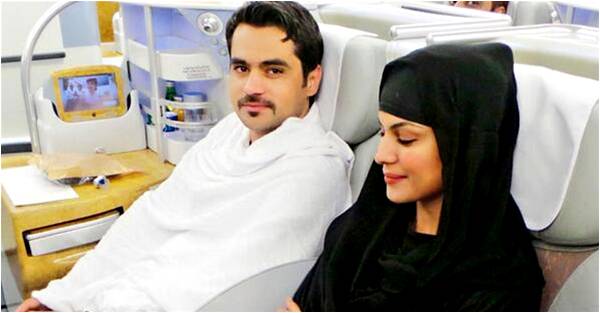
The sudden transformation, the repentance for past ‘sins’, the sati saavitri’s garb. Veena Malik is nothing if not entertaining. But is her latest incarnation a clever ploy to worm herself back into Pakistani society now that she is married to a Pathan, or a real about-turn many before her have managed to successfully bottle and market (Junaid Jamshed and Imran Khan for starters).
Guiding us to a small, dingy room with a sofa and piles of dumped goods, Veena Malik’s manager apologized for the state of their house: “Veena ji has just recently re-opened this place and we are about to start renovations”, we were told. Half an hour later her husband Asad Khan Khattak ushered us into a spacious open-space living room-cum-kitchen (largely empty except for a couple of sofas and a sidetable) from whence Veena emerged beaming, wearing a flared frock-like shirt that went down to her toes, no dupatta in sight and face heavily made-up, likely the result of earlier enquiries about whether we would conduct a photoshoot. Transgender employees stood around the room listening in to the proceedings. Other than her manager everyone working in the house was transgender.
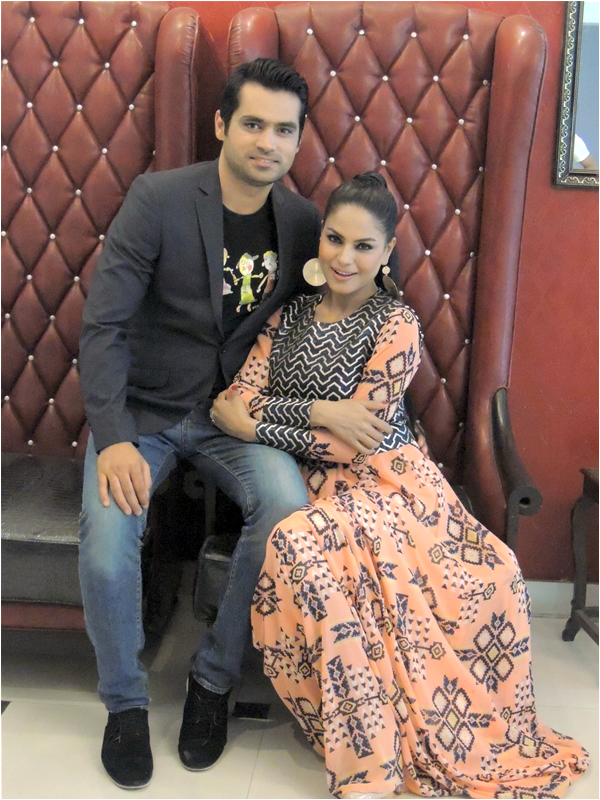
As we all settled down the husband and wife continued a conversation that had likely begun before our arrival, about the paint they had chosen for the exterior walls of their house turning out to be exactly the same colour as their neighbour’s. Serious pondering was going on as to how to deal with this domestic glitch. Rather endearing. As was the fact that Veena held hands with Asad throughout our hour-long conversation. More cynical types may be inclined to dismiss this as another show of Veena-ness but the body language between the two, at least for now, suggests something real.
His English, just like Veena’s was fairly fluent, but with an accent even more uneven than his wife’s. It elicited in me a mix of bewilderment and admiration. Rarely does one come across younger Pakistanis whose accent and fluency are not interconnected. That fact alone makes me see them as soul mates of some kind. What’s admirable about Veena, something she shares with fellow actors Reem and Meera, is a burning desire for upward mobility, the hunger to claw out of the box that an elitist society inevitably places the less socially polished into. It isn’t about money, it’s about class. Reema cultivated it most while Meera least successfully; Veena is harder to categorize. Certainly the more intellectually sophisticated of the three, she can swing from saying something profound and insightful to so transparently self-contradictory that you can only do so much from laughing out loud.
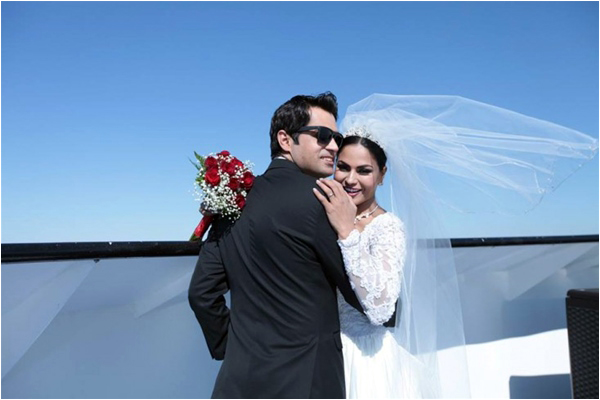
“Is your recent shift towards religion to make yourself more palatable to society?” I ask.
[quote]"Alhamdulilliah I was born in a Muslim family...Muslim Army family"[/quote]
“I don’t do things to please people, [considering] the kind of personality I have. I have realized things on my own. My interest in religion is not new. Just because I didn’t promote that side of my personality before doesn’t mean I wasn’t interested in it. Alhamdulilliah I was born in a Muslim family...Muslim Army family. I have been raised reading the Quran, learning how to say my prayers. So wearing a dupatta is not something new that is happening to me. It is my personal choice. I have always been a very spiritual person. I always used to tell Asad about my collection of old books. I have a huge collection of Islamic books already. Bachpan se hee meray pass kitnay naat ke collections hayn jo mayn parhtee rehtee thee. In school I would always recite naat and qirat.”
“There have been attacks on journalists recently or anybody whose views are slightly different from the mainstream. So your conservative shift isn’t about making yourself feel secure in Pakistan?”
“Not at all. If I would have felt insecure or anything I wouldn’t have been living here. This is my country. I belong here. I am an army brat. I don’t think I am the kind of woman who would be threatened because of anyone. But in terms of insecurity, recently I was reading an article, don’t remember the name of the publication, but it said that Pakistan is probably becoming a dangerous country for journalists. I have featured on a lot of news channels. I can say I have been a bit of a journalist too. I would say If you want to progress you have to have a free media, you have to have your own point of view and people should accept that point of view. Even if they don’t accept it, they have to have enough guts to listen to it.”
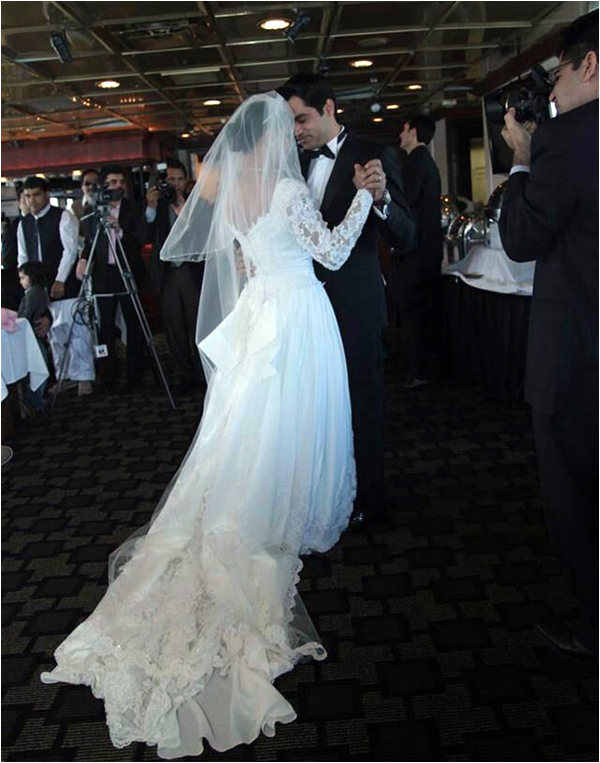
“What do you think about the current clash between the media and the ISI?”
“Whenever there is a clash between the two pillars of our state, the media and the army, it only harms the nation. It is the responsibility of every instititution that they don’t cross their limits. That they don’t get into the territory of another institution. When that happens it obviously damages the country. Those who support this aren’t friends of Pakistan. Every institution sould get freedom within certain prescribed limits.”
“Should one be made to suffer for going beyond certain limits?”
“When you have an individual point of view then you have to suffer its consequences. I had a different point of view and at one point in time I expressed it, and I have suffered for it. I corrected all the things on my behalf. Religion, culture, rasm-o-rivaaj. Yeh sab kuch soch kar banaae gae hayn. If we start questioning everything then nothing will stay. If everybody is a rebel the society will not be a civilized society.”
“Wasn’t your time in India that of a rebel?”
“No. I have never been a rebel. I was working in India according to that industry. I wore the clothes that all the other Indian actresses are wearing. I worked according to the standards of the Indian censor board. That is not rebellion. When I worked in Pakistan all my projects were according to the censor board here. None of my films were stopped from release because I was doing anything so outrageous it wasn’t acceptable.”
“So what have you come to Pakistan for?” asks my colleague
Veena seems quite taken aback by this question, blinks her eyes and laughs, “What have I come to Pakistan for? It’s my country. I belong here.”
“I mean, didn’t you say you were going to live In Dubai?’
“We are going to keep travelling. I am not going to say I won’t set foot out of Pakistan. We have houses all over...”
Here her husband who has been perfectly quiet so far intervenes
“We have houses in Pakistan, in Dubai, in the US, wherever we want to go we can go.”
[quote]"As we are ambassadors of human rights now we are going to work in Pakistan"[/quote]
“As far as work is concerned I would like to stay in Pakistan”, she continues. Her husband making sure the term ‘work’ is understood properly, adds: “As we are ambassadors of human rights now we are going to work in Pakistan.”
I fear our paper’s reputation has preceded us, and talk of journalism has pushed Veena into some kind of intellectual-rhetorical corner. I steer the conversation into another direction.
“So how did you guys meet?”
My colleague who is armed to the teeth with background on Veena looks slightly annoyed, apparently my question has been answered couple dozens of times before, but the two of them don’t mind my ignorance if it means reliving the story of their coming together one more time. Unlike other yarns Veena spins that one suspects of being shrouded in artifice, the love story comes out spontaneously and gleefully. The two correct each other on minor details of their how-we-met story. Apparently Veena initiated the conversation with Asad at the US embassy, who aware of who she was, felt flattered by the attention. After much delay and the serendepitous chance of them both leaving and then arriving back at the embassy at the same time, Veena suggested a cup of tea.
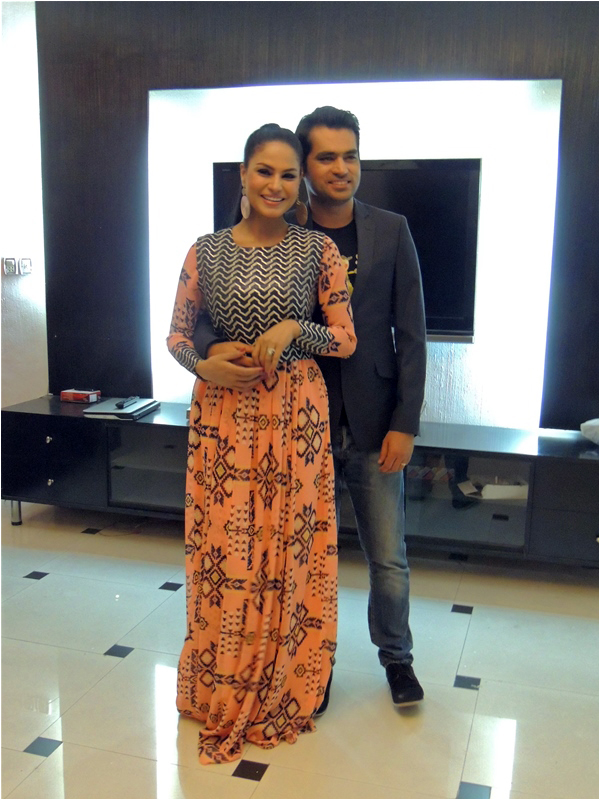
“We were sipping tea and talking. Actually, she was talking, I was listening.”
“That’s when I knew he would make a very good husband,” says Veena with a throaty laugh.
The story after this goes the way all marriage stories in Pakistan are retrospectively spinned. Parents met, they liked each other and rishta was cemented. ‘Love marriage’ is thus turned into a respectable arranged one.
They married within 10 days because Asad’s family was to go for Umrah and Veena wanted to go along. Apparently it had been her ‘lifelong’ wish. Asad wants to emphasize on the repentance aspect of the umrah and the fact that she has moved on. Questions about Veena’s past annoy him and he is far more interested in talking about their humanitarian work in Pakistan. I am not yet willing to let go of their love story.
[quote]"Actually, white wedding is sort of a Muslim tradition"[/quote]
“What’s with the whole white wedding thing?”
“Oh that, says Veena. That was my great wish ever since I have been young, to have a white wedding. I shared it with Asad who liked the idea and also came on board. He arranged everything for my white wedding. Actually, white wedding is sort of a Muslim tradition”.
“Middle Eastern”, Asad interjects.
“When you landed at the airport you said you have now matured. What does that mean? That you have lost your spunk?”
“I was a kind of brat. I was spoilt. A girl who gets her name and fame and so much money at such an early age, and then you are an army blood, too independent, too brave, then you make your own decisions and you learn things in your own way. But I am blessed that I didn’t take too long to see the light. If you are asking me whether people will see me in a short dress ever again, well I don’t think that’s ever going to happen, but my personality’s never going to change.”
“Has he stopped you?” asks Ammara nodding at Asad
“No, I haven’t told her anything. It is entirely her choice. This is her choice, dupatta...”
[quote]"I feel so good in complete clothes. I feel so secure"[/quote]
“No one can influence me in my decisions. I don’t think I am the kind of girl that anybody can influence. This is purely my own decision. And trust me I feel so good in complete clothes. I feel so secure. When I wear burqa I feel so secure. Nobody is looking at my curves. My curves are hidden. This is something very beautiful. Regarding short clothes, I have been there and done that. I have enjoyed myself.”
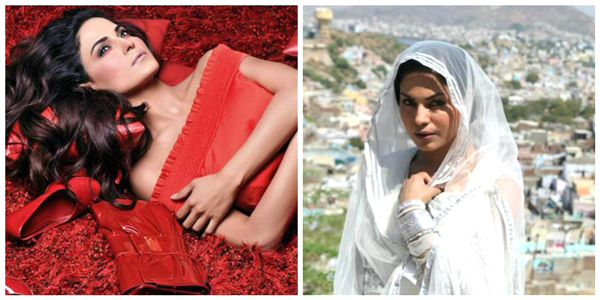
“There is this idea that once you get married your career is over. Is your acting career over?”
“It has just started”, says Asad before Veena can say anything.
“Did you hear that? I have a partner now. People keep telling me that I have now gotten married so things are over for me now. No they aren’t. Things have taken a new turn. I am on a new journey. But I have a partner now. He will keep pushing me. I am kind of lazy and introverted, but he keeps pushing me. Today’s interview also happened only because of him. I will do work but it will all be one notch higher”
“Will you join politics?”
“Yes. Definitely.”
“PTI?”
“We like Imran Khan’s vision. We care about the vision a political aprty presents. People are always criticizing politicians but there are some good politicians too. If there weren’t the parliament wouldn’t be functional still. There are other visionaries too. I like Shahbaz Sharif. At least he is doing something even if he is doing it in a particular area. I was a huge, huge fan of Benazir Bhutto. Bhutto as well. But liking Imran Khan’s vision doesn’t mean I have joined PTI”
[quote]"I was a huge, huge fan of Benazir Bhutto"[/quote]
“Is that what you aspire to be? Benzair?”
“No. I aspire to be Veena Malik only.”
“But would you like to have that level of success?”
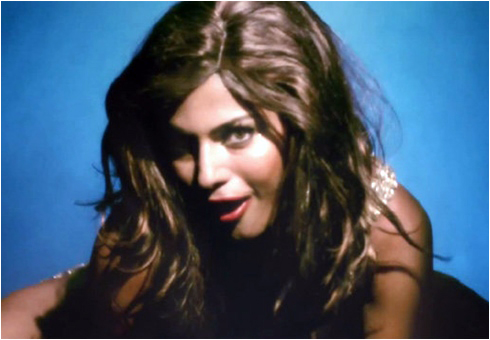 “No. I’d like to have my own level of success. I can never ever be like her. She was the ultimate politician for me. I really, really love her. Besides politics is not something that you decide to do and the next day you are a politician. Everything has a way of getting into. Like you take an admission at a school, there is a certain procedure. There are terms and conditions for everything.”
“No. I’d like to have my own level of success. I can never ever be like her. She was the ultimate politician for me. I really, really love her. Besides politics is not something that you decide to do and the next day you are a politician. Everything has a way of getting into. Like you take an admission at a school, there is a certain procedure. There are terms and conditions for everything.”
“Do you think your past or your FHM shoot will be used against you if you join politics?”
“It was the past. I am fed up of these kinds of questions. You should now ask about her future plans. What is she going to do for the country...” Asad says with a glimmer of Pathan anger.
“Ok, just for one more person, that was a doctored picture.”
“After our wedding we went for Umrah and she gave a live statement on television that she had asked forgiveness for everything. Whatever she did...whatever you guys think she did wrong, that’s all done.” Asad stops for breath here then lightens up the moment with, “Let me tell you one thing. Whenever she joins politics, sab ki band bajnay waali hae.”
“Are you planning a family?”
“Yes, she is”, says Asad for her. “She is not like other...”,
He is cut off by Veena.
“I don’t think anyone can get married with four movies on the floor. When your career is on the peak and when you are just 27 years old..”
“But then you see a handsome guy who is an American, you can’t control yourself. And you say okay go ahead, I don’t care...”, adds Asad.
“Where do you see yourself in ten years?”
“Better, happier, more settled. Probably in a better house. Probably with more family members”
At the time we conducted this interview the blasphemy controversy involving Shaista Wahidi’s morning show (where a qawwali was played as backdrop to a joota-chupaai rasm during a televised reenactment of Veena and Asad’s wedding) had not erupted as yet, after which sources claim Veena has gone ‘underground’. Much of what Veena said to us feels deeply ironic in retrospect – the emphasis on human rights work, the great contortions to try and fit in, saying the right things, denouncing the past – all imagined to be shields against precisely such an eventuality coming to naught. It seems the garb of piety only works if you are a powerful man backed by the establishment.
Guiding us to a small, dingy room with a sofa and piles of dumped goods, Veena Malik’s manager apologized for the state of their house: “Veena ji has just recently re-opened this place and we are about to start renovations”, we were told. Half an hour later her husband Asad Khan Khattak ushered us into a spacious open-space living room-cum-kitchen (largely empty except for a couple of sofas and a sidetable) from whence Veena emerged beaming, wearing a flared frock-like shirt that went down to her toes, no dupatta in sight and face heavily made-up, likely the result of earlier enquiries about whether we would conduct a photoshoot. Transgender employees stood around the room listening in to the proceedings. Other than her manager everyone working in the house was transgender.

As we all settled down the husband and wife continued a conversation that had likely begun before our arrival, about the paint they had chosen for the exterior walls of their house turning out to be exactly the same colour as their neighbour’s. Serious pondering was going on as to how to deal with this domestic glitch. Rather endearing. As was the fact that Veena held hands with Asad throughout our hour-long conversation. More cynical types may be inclined to dismiss this as another show of Veena-ness but the body language between the two, at least for now, suggests something real.
His English, just like Veena’s was fairly fluent, but with an accent even more uneven than his wife’s. It elicited in me a mix of bewilderment and admiration. Rarely does one come across younger Pakistanis whose accent and fluency are not interconnected. That fact alone makes me see them as soul mates of some kind. What’s admirable about Veena, something she shares with fellow actors Reem and Meera, is a burning desire for upward mobility, the hunger to claw out of the box that an elitist society inevitably places the less socially polished into. It isn’t about money, it’s about class. Reema cultivated it most while Meera least successfully; Veena is harder to categorize. Certainly the more intellectually sophisticated of the three, she can swing from saying something profound and insightful to so transparently self-contradictory that you can only do so much from laughing out loud.

“Is your recent shift towards religion to make yourself more palatable to society?” I ask.
[quote]"Alhamdulilliah I was born in a Muslim family...Muslim Army family"[/quote]
“I don’t do things to please people, [considering] the kind of personality I have. I have realized things on my own. My interest in religion is not new. Just because I didn’t promote that side of my personality before doesn’t mean I wasn’t interested in it. Alhamdulilliah I was born in a Muslim family...Muslim Army family. I have been raised reading the Quran, learning how to say my prayers. So wearing a dupatta is not something new that is happening to me. It is my personal choice. I have always been a very spiritual person. I always used to tell Asad about my collection of old books. I have a huge collection of Islamic books already. Bachpan se hee meray pass kitnay naat ke collections hayn jo mayn parhtee rehtee thee. In school I would always recite naat and qirat.”
“There have been attacks on journalists recently or anybody whose views are slightly different from the mainstream. So your conservative shift isn’t about making yourself feel secure in Pakistan?”
“Not at all. If I would have felt insecure or anything I wouldn’t have been living here. This is my country. I belong here. I am an army brat. I don’t think I am the kind of woman who would be threatened because of anyone. But in terms of insecurity, recently I was reading an article, don’t remember the name of the publication, but it said that Pakistan is probably becoming a dangerous country for journalists. I have featured on a lot of news channels. I can say I have been a bit of a journalist too. I would say If you want to progress you have to have a free media, you have to have your own point of view and people should accept that point of view. Even if they don’t accept it, they have to have enough guts to listen to it.”

“What do you think about the current clash between the media and the ISI?”
“Whenever there is a clash between the two pillars of our state, the media and the army, it only harms the nation. It is the responsibility of every instititution that they don’t cross their limits. That they don’t get into the territory of another institution. When that happens it obviously damages the country. Those who support this aren’t friends of Pakistan. Every institution sould get freedom within certain prescribed limits.”
“Should one be made to suffer for going beyond certain limits?”
“When you have an individual point of view then you have to suffer its consequences. I had a different point of view and at one point in time I expressed it, and I have suffered for it. I corrected all the things on my behalf. Religion, culture, rasm-o-rivaaj. Yeh sab kuch soch kar banaae gae hayn. If we start questioning everything then nothing will stay. If everybody is a rebel the society will not be a civilized society.”
“Wasn’t your time in India that of a rebel?”
“No. I have never been a rebel. I was working in India according to that industry. I wore the clothes that all the other Indian actresses are wearing. I worked according to the standards of the Indian censor board. That is not rebellion. When I worked in Pakistan all my projects were according to the censor board here. None of my films were stopped from release because I was doing anything so outrageous it wasn’t acceptable.”
“So what have you come to Pakistan for?” asks my colleague
Veena seems quite taken aback by this question, blinks her eyes and laughs, “What have I come to Pakistan for? It’s my country. I belong here.”
“I mean, didn’t you say you were going to live In Dubai?’
“We are going to keep travelling. I am not going to say I won’t set foot out of Pakistan. We have houses all over...”
Here her husband who has been perfectly quiet so far intervenes
“We have houses in Pakistan, in Dubai, in the US, wherever we want to go we can go.”
[quote]"As we are ambassadors of human rights now we are going to work in Pakistan"[/quote]
“As far as work is concerned I would like to stay in Pakistan”, she continues. Her husband making sure the term ‘work’ is understood properly, adds: “As we are ambassadors of human rights now we are going to work in Pakistan.”
I fear our paper’s reputation has preceded us, and talk of journalism has pushed Veena into some kind of intellectual-rhetorical corner. I steer the conversation into another direction.
“So how did you guys meet?”
My colleague who is armed to the teeth with background on Veena looks slightly annoyed, apparently my question has been answered couple dozens of times before, but the two of them don’t mind my ignorance if it means reliving the story of their coming together one more time. Unlike other yarns Veena spins that one suspects of being shrouded in artifice, the love story comes out spontaneously and gleefully. The two correct each other on minor details of their how-we-met story. Apparently Veena initiated the conversation with Asad at the US embassy, who aware of who she was, felt flattered by the attention. After much delay and the serendepitous chance of them both leaving and then arriving back at the embassy at the same time, Veena suggested a cup of tea.

“We were sipping tea and talking. Actually, she was talking, I was listening.”
“That’s when I knew he would make a very good husband,” says Veena with a throaty laugh.
The story after this goes the way all marriage stories in Pakistan are retrospectively spinned. Parents met, they liked each other and rishta was cemented. ‘Love marriage’ is thus turned into a respectable arranged one.
They married within 10 days because Asad’s family was to go for Umrah and Veena wanted to go along. Apparently it had been her ‘lifelong’ wish. Asad wants to emphasize on the repentance aspect of the umrah and the fact that she has moved on. Questions about Veena’s past annoy him and he is far more interested in talking about their humanitarian work in Pakistan. I am not yet willing to let go of their love story.
[quote]"Actually, white wedding is sort of a Muslim tradition"[/quote]
“What’s with the whole white wedding thing?”
“Oh that, says Veena. That was my great wish ever since I have been young, to have a white wedding. I shared it with Asad who liked the idea and also came on board. He arranged everything for my white wedding. Actually, white wedding is sort of a Muslim tradition”.
“Middle Eastern”, Asad interjects.
“When you landed at the airport you said you have now matured. What does that mean? That you have lost your spunk?”
“I was a kind of brat. I was spoilt. A girl who gets her name and fame and so much money at such an early age, and then you are an army blood, too independent, too brave, then you make your own decisions and you learn things in your own way. But I am blessed that I didn’t take too long to see the light. If you are asking me whether people will see me in a short dress ever again, well I don’t think that’s ever going to happen, but my personality’s never going to change.”
“Has he stopped you?” asks Ammara nodding at Asad
“No, I haven’t told her anything. It is entirely her choice. This is her choice, dupatta...”
[quote]"I feel so good in complete clothes. I feel so secure"[/quote]
“No one can influence me in my decisions. I don’t think I am the kind of girl that anybody can influence. This is purely my own decision. And trust me I feel so good in complete clothes. I feel so secure. When I wear burqa I feel so secure. Nobody is looking at my curves. My curves are hidden. This is something very beautiful. Regarding short clothes, I have been there and done that. I have enjoyed myself.”

“There is this idea that once you get married your career is over. Is your acting career over?”
“It has just started”, says Asad before Veena can say anything.
“Did you hear that? I have a partner now. People keep telling me that I have now gotten married so things are over for me now. No they aren’t. Things have taken a new turn. I am on a new journey. But I have a partner now. He will keep pushing me. I am kind of lazy and introverted, but he keeps pushing me. Today’s interview also happened only because of him. I will do work but it will all be one notch higher”
“Will you join politics?”
“Yes. Definitely.”
“PTI?”
“We like Imran Khan’s vision. We care about the vision a political aprty presents. People are always criticizing politicians but there are some good politicians too. If there weren’t the parliament wouldn’t be functional still. There are other visionaries too. I like Shahbaz Sharif. At least he is doing something even if he is doing it in a particular area. I was a huge, huge fan of Benazir Bhutto. Bhutto as well. But liking Imran Khan’s vision doesn’t mean I have joined PTI”
[quote]"I was a huge, huge fan of Benazir Bhutto"[/quote]
“Is that what you aspire to be? Benzair?”
“No. I aspire to be Veena Malik only.”
“But would you like to have that level of success?”
 “No. I’d like to have my own level of success. I can never ever be like her. She was the ultimate politician for me. I really, really love her. Besides politics is not something that you decide to do and the next day you are a politician. Everything has a way of getting into. Like you take an admission at a school, there is a certain procedure. There are terms and conditions for everything.”
“No. I’d like to have my own level of success. I can never ever be like her. She was the ultimate politician for me. I really, really love her. Besides politics is not something that you decide to do and the next day you are a politician. Everything has a way of getting into. Like you take an admission at a school, there is a certain procedure. There are terms and conditions for everything.”“Do you think your past or your FHM shoot will be used against you if you join politics?”
“It was the past. I am fed up of these kinds of questions. You should now ask about her future plans. What is she going to do for the country...” Asad says with a glimmer of Pathan anger.
“Ok, just for one more person, that was a doctored picture.”
“After our wedding we went for Umrah and she gave a live statement on television that she had asked forgiveness for everything. Whatever she did...whatever you guys think she did wrong, that’s all done.” Asad stops for breath here then lightens up the moment with, “Let me tell you one thing. Whenever she joins politics, sab ki band bajnay waali hae.”
“Are you planning a family?”
“Yes, she is”, says Asad for her. “She is not like other...”,
He is cut off by Veena.
“I don’t think anyone can get married with four movies on the floor. When your career is on the peak and when you are just 27 years old..”
“But then you see a handsome guy who is an American, you can’t control yourself. And you say okay go ahead, I don’t care...”, adds Asad.
“Where do you see yourself in ten years?”
“Better, happier, more settled. Probably in a better house. Probably with more family members”
At the time we conducted this interview the blasphemy controversy involving Shaista Wahidi’s morning show (where a qawwali was played as backdrop to a joota-chupaai rasm during a televised reenactment of Veena and Asad’s wedding) had not erupted as yet, after which sources claim Veena has gone ‘underground’. Much of what Veena said to us feels deeply ironic in retrospect – the emphasis on human rights work, the great contortions to try and fit in, saying the right things, denouncing the past – all imagined to be shields against precisely such an eventuality coming to naught. It seems the garb of piety only works if you are a powerful man backed by the establishment.

